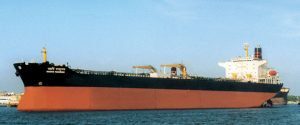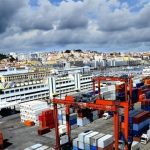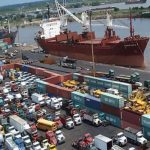
With Nigeria’s unemployment rate reaching an all time high of 23.10 percent in the third quarter of 2018 from 22.70 percent in the 2nd quarter, key economy players have called for more government engagement in the shipping and maritime industry.
They say Nigeria’s shipping and maritime industry is at a vantage position to bridge the nation’s unemployment gap.
Indigenous shipowners are certain that enabling policies will open up huge potential for job creation in the sector.
The leadership of Nigeria Indigenous shipowners is convinced that the sector has the capacity to generate massive employment, but is being disadvantaged by restrictive policies.
There is a contention that for as long as foreign shipowners continue to enjoy waivers and tax concessions, on Nigeria’s waters, growing indigenous participation for massive job creation will be frustrated.
The continued delay in the disbursement of intervention funds for indigenous shipping development is seen as another major drawback to drive up employment possibilities in the sector.

With Nigeria’s unemployment rate reaching an all time high of 23.10 percent in the third quarter of 2018 from 22.70 percent in the 2nd quarter, key economy players have called for more government engagement in the shipping and maritime industry.
They say Nigeria’s shipping and maritime industry is at a vantage position to bridge the nation’s unemployment gap.
Indigenous shipowners are certain that enabling policies will open up huge potential for job creation in the sector.
The leadership of Nigeria Indigenous shipowners is convinced that the sector has the capacity to generate massive employment, but is being disadvantaged by restrictive policies.
There is a contention that for as long as foreign shipowners continue to enjoy waivers and tax concessions, on Nigeria’s waters, growing indigenous participation for massive job creation will be frustrated.
The continued delay in the disbursement of intervention funds for indigenous shipping development is seen as another major drawback to drive up employment possibilities in the sector.

With Nigeria’s unemployment rate reaching an all time high of 23.10 percent in the third quarter of 2018 from 22.70 percent in the 2nd quarter, key economy players have called for more government engagement in the shipping and maritime industry.
They say Nigeria’s shipping and maritime industry is at a vantage position to bridge the nation’s unemployment gap.
Indigenous shipowners are certain that enabling policies will open up huge potential for job creation in the sector.
The leadership of Nigeria Indigenous shipowners is convinced that the sector has the capacity to generate massive employment, but is being disadvantaged by restrictive policies.
There is a contention that for as long as foreign shipowners continue to enjoy waivers and tax concessions, on Nigeria’s waters, growing indigenous participation for massive job creation will be frustrated.
The continued delay in the disbursement of intervention funds for indigenous shipping development is seen as another major drawback to drive up employment possibilities in the sector.

With Nigeria’s unemployment rate reaching an all time high of 23.10 percent in the third quarter of 2018 from 22.70 percent in the 2nd quarter, key economy players have called for more government engagement in the shipping and maritime industry.
They say Nigeria’s shipping and maritime industry is at a vantage position to bridge the nation’s unemployment gap.
Indigenous shipowners are certain that enabling policies will open up huge potential for job creation in the sector.
The leadership of Nigeria Indigenous shipowners is convinced that the sector has the capacity to generate massive employment, but is being disadvantaged by restrictive policies.
There is a contention that for as long as foreign shipowners continue to enjoy waivers and tax concessions, on Nigeria’s waters, growing indigenous participation for massive job creation will be frustrated.
The continued delay in the disbursement of intervention funds for indigenous shipping development is seen as another major drawback to drive up employment possibilities in the sector.

With Nigeria’s unemployment rate reaching an all time high of 23.10 percent in the third quarter of 2018 from 22.70 percent in the 2nd quarter, key economy players have called for more government engagement in the shipping and maritime industry.
They say Nigeria’s shipping and maritime industry is at a vantage position to bridge the nation’s unemployment gap.
Indigenous shipowners are certain that enabling policies will open up huge potential for job creation in the sector.
The leadership of Nigeria Indigenous shipowners is convinced that the sector has the capacity to generate massive employment, but is being disadvantaged by restrictive policies.
There is a contention that for as long as foreign shipowners continue to enjoy waivers and tax concessions, on Nigeria’s waters, growing indigenous participation for massive job creation will be frustrated.
The continued delay in the disbursement of intervention funds for indigenous shipping development is seen as another major drawback to drive up employment possibilities in the sector.

With Nigeria’s unemployment rate reaching an all time high of 23.10 percent in the third quarter of 2018 from 22.70 percent in the 2nd quarter, key economy players have called for more government engagement in the shipping and maritime industry.
They say Nigeria’s shipping and maritime industry is at a vantage position to bridge the nation’s unemployment gap.
Indigenous shipowners are certain that enabling policies will open up huge potential for job creation in the sector.
The leadership of Nigeria Indigenous shipowners is convinced that the sector has the capacity to generate massive employment, but is being disadvantaged by restrictive policies.
There is a contention that for as long as foreign shipowners continue to enjoy waivers and tax concessions, on Nigeria’s waters, growing indigenous participation for massive job creation will be frustrated.
The continued delay in the disbursement of intervention funds for indigenous shipping development is seen as another major drawback to drive up employment possibilities in the sector.

With Nigeria’s unemployment rate reaching an all time high of 23.10 percent in the third quarter of 2018 from 22.70 percent in the 2nd quarter, key economy players have called for more government engagement in the shipping and maritime industry.
They say Nigeria’s shipping and maritime industry is at a vantage position to bridge the nation’s unemployment gap.
Indigenous shipowners are certain that enabling policies will open up huge potential for job creation in the sector.
The leadership of Nigeria Indigenous shipowners is convinced that the sector has the capacity to generate massive employment, but is being disadvantaged by restrictive policies.
There is a contention that for as long as foreign shipowners continue to enjoy waivers and tax concessions, on Nigeria’s waters, growing indigenous participation for massive job creation will be frustrated.
The continued delay in the disbursement of intervention funds for indigenous shipping development is seen as another major drawback to drive up employment possibilities in the sector.

With Nigeria’s unemployment rate reaching an all time high of 23.10 percent in the third quarter of 2018 from 22.70 percent in the 2nd quarter, key economy players have called for more government engagement in the shipping and maritime industry.
They say Nigeria’s shipping and maritime industry is at a vantage position to bridge the nation’s unemployment gap.
Indigenous shipowners are certain that enabling policies will open up huge potential for job creation in the sector.
The leadership of Nigeria Indigenous shipowners is convinced that the sector has the capacity to generate massive employment, but is being disadvantaged by restrictive policies.
There is a contention that for as long as foreign shipowners continue to enjoy waivers and tax concessions, on Nigeria’s waters, growing indigenous participation for massive job creation will be frustrated.
The continued delay in the disbursement of intervention funds for indigenous shipping development is seen as another major drawback to drive up employment possibilities in the sector.













